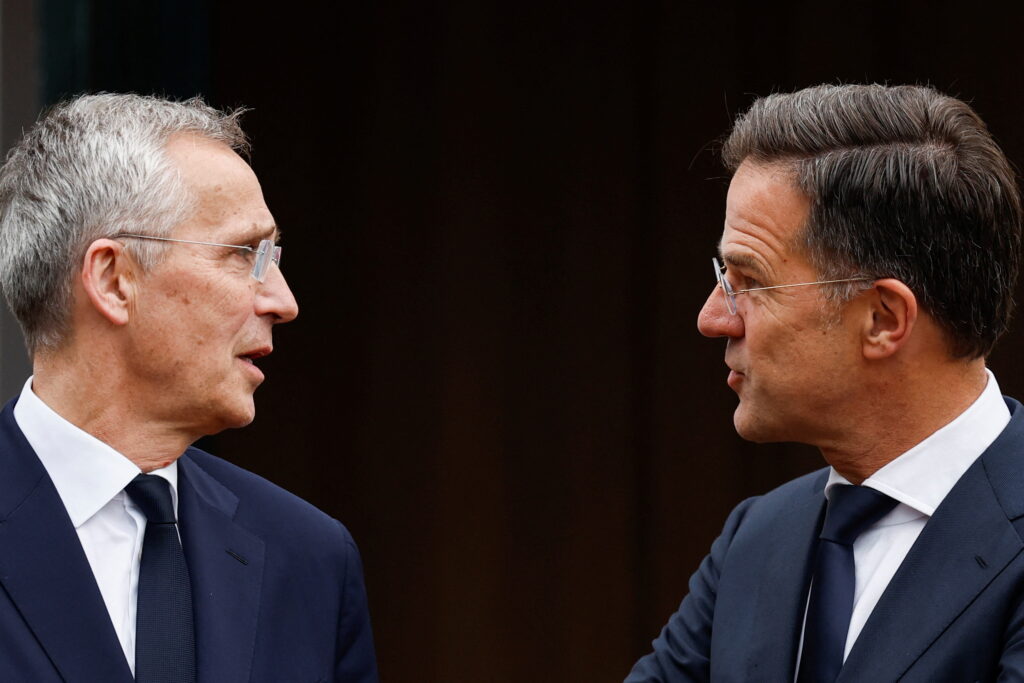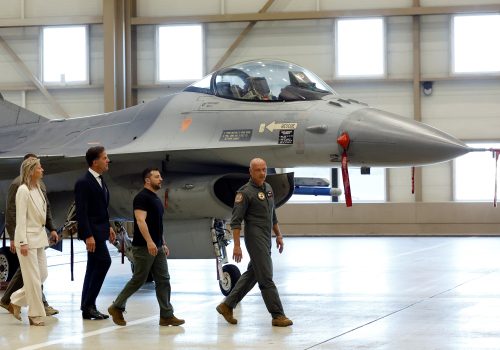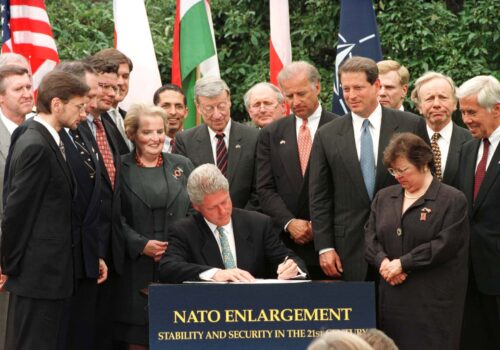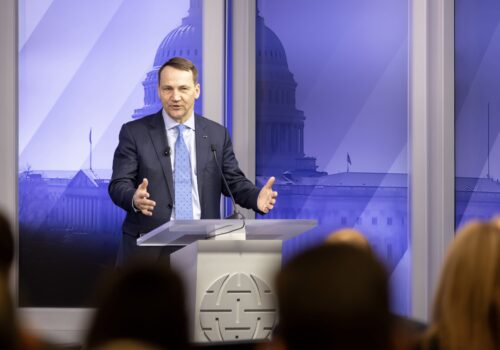After a decade of service and four extensions of his mandate, Jens Stoltenberg is scheduled to step down as NATO secretary general in October. He has been a charismatic leader who has successfully led the Alliance through a defining period. Stoltenberg presided over an Alliance that reinvented itself as an organization focused on territorial defense and expanded its membership to include almost the entirety of the European and North American continents. Both developments were very much driven by Russian aggression against Ukraine since 2014, as well as by Moscow’s increasingly belligerent rhetoric against the West.
Stoltenberg’s successor will have to deal with the political fallout of two decades of interventions across the globe, including the traumatic experiences of NATO’s involvement in wars in Afghanistan, Iraq, and Libya. These conflicts were not popular among all electorates throughout the Alliance, and they were felt in some countries in Europe, particularly among new NATO allies in the east, as campaigns that were not necessarily theirs. Many of these allies now would like NATO to concentrate on what they see as its core purpose—collective defense in Europe.
Restoring the deterrence and defense posture in Europe that NATO abandoned after the Cold War will certainly top the agenda of the next secretary general. The threat of conflict from Moscow and pressure from Washington on European allies to do more for their own defense will define this effort. But there is more . . . NATO still has two other core tasks: crisis management and cooperative security. The next leader of the Alliance must be able to unite thirty-two allies around all three core tasks, which might include, for example, a maritime mission to counter Houthi aggression against commercial and military vessels off the coast of Yemen. It could also include an intervention in increasingly fragile parts of the Western Balkans.
Allies will also rightly expect that counterterrorism, countering cyber threats, and addressing the impact of climate change on security are addressed with an equal sense of urgency. What’s more, NATO has acknowledged that an emerging China merits its attention. Although China does not pose a direct military threat to the Alliance, allies will at least encounter Chinese military presence across the global commons: the high seas, maritime choke points, space, cyber, and the North Pole. The next secretary general will have an opportunity to steer the debate inside the Alliance and to define the extent of its involvement in these issues. Finally, the next secretary general must make progress on cooperation with the European Union (EU), which, under Stoltenberg and his EU counterparts has not gone beyond well-intentioned statements.
The front-runner
Whereas Stoltenberg emerged as a surprise candidate with hardly any competition in 2014, this time there is a clear front-runner in Dutch Prime Minister Mark Rutte. Rutte has proven himself to be a Stoltenberg-like charismatic leader. While not necessarily a great visionary leader, he is one who knows everyone, is seen on the world stage as a seasoned politician able to make pragmatic deals, and would be able to keep an Alliance of thirty-two nations with differing priorities together.
Rutte seems to be the preferred candidate among most allies, including the “big four”—France, Germany, the United Kingdom, and the United States. He has a solid track record as the second longest-serving current European leader, after Hungarian Prime Minister Viktor Orbán. He has also shown his political skills at bridging political divides in domestic politics by leading four governments of different compositions, mostly with a minority in the Dutch senate. On the EU side, he has helped broker immigration deals with Turkey and several North African nations, while on the NATO side he has shown a remarkable talent for dealing with former US President (and current candidate) Donald Trump. Rutte famously contradicted Trump during a press conference in the Oval Office, when the then president suggested it would be acceptable if the United States and EU failed to reach a deal on tariffs. And Rutte saved the day during the 2018 Brussels Summit. When Trump warned the United States might “go our own way” if allies didn’t increase defense spending, the Dutch prime minister suggested that the US president could claim credit for the recent increases in defense spending among NATO allies, which reportedly “rescued” the meeting.
Rutte himself, of course, has not always prioritized increasing his own country’s defense spending. Although he personally signed the Defense Investment Pledge twice (in 2014 and 2016), under his leadership, Dutch defense spending dipped close to the lowest among NATO members, hovering around one percent of gross domestic product in recent years. (It now, finally, approaches the 2 percent benchmark.) On the other hand, under his premiership Dutch support for Ukraine has been exemplary and a stimulus for other allies.
Another argument against Rutte’s candidacy is his nationality. The Dutch have had the secretary general post three times already for a total of twenty-one years. Moreover, during NATO’s seventy-five years of existence, most secretaries general have been from northwestern Europe, except for one leader from Spain (Javier Solana) and one from Italy (Manlio Brosio). The argument that NATO leaders should have a wider geographic distribution was heard when Romanian President Klaus Ioannis put his name forward in February. Estonian Prime Minister Kaja Kallas has also been named as a potential candidate. Although the current deputy secretary general, Mircea Geoană, is a Romanian, and the previous chairman of the Military Committee, Petr Pavel, is a Czech, this is a valid point. In addition, however, it is deemed important among some NATO members that the next secretary general is not perceived as too antagonistic toward Russia, to keep the option of dialogue with Russia on the table. This could diminish enthusiasm for some potential candidates from Central and Eastern Europe that have been among the most critical of Russia.
This contest, then, is apparently Rutte’s to lose. But his candidacy is not quite assured. The consensus rule requires that all allied leaders, including notoriously difficult ones such as Turkish President Recep Tayyip Erdoğan and Orbán, agree on the selection of the secretary general. Hungary, for instance, already this week voiced its initial opposition to Rutte. And satisfying the wish of equal representation of new and old allies may require some kind of package deal, possibly even involving high-level EU posts. Since there are no concrete rules or best practices for leadership selection like at the United Nations (continental rotation) or the European Union (taking into account European Parliament elections), the outcome remains uncertain. Yet, a leader with a resume like Rutte’s, from a nation with a solid transatlantic track record like the Netherlands, serving as the next secretary general of NATO should be an outcome that most everyone can live with.
A timely decision is in everyone’s interest. July’s summit in Washington, DC, which will mark NATO’s seventy-fifth anniversary, would be the ideal occasion to demonstrate the Alliance’s unity by announcing the new secretary general.
Timo S. Koster is a former career diplomat at the Dutch Ministry of Foreign Affairs and NATO International Staff, and nonresident senior fellow with the Atlantic Council’s Scowcroft Center for Strategy and Security. From 2018 to 2021, he served as ambassador-at-large for security policy and cyber. Follow him on X at @tskos.
Further reading
Tue, Aug 29, 2023
The Dutch are leading the way on military aid to Ukraine. Here’s why.
New Atlanticist By Timo S. Koster
The Netherlands is punching above its weight in terms of military aid to Ukraine, in part because the Dutch have felt firsthand the threat Putin poses.
Wed, Mar 6, 2024
NATO enlargement at twenty-five: How we got there and what it achieved
New Atlanticist By
Two and a half decades after Poland, Hungary, and the Czech Republic joined NATO, their membership continues to protect them from Russian aggression.
Mon, Feb 26, 2024
Polish Foreign Minister Radosław Sikorski: ‘Helping Ukraine is not only a good deed. It’s also a good deal.’
New Atlanticist By
The United States must continue to back Ukraine and deepen its alliances to stop Putin's aggression and prevent a wider global conflict.
Image: Dutch Prime Minister Mark Rutte speaks with NATO Secretary General Jens Stoltenberg ahead of a working dinner for NATO leaders at the Catshuis, in The Hague, Netherlands June 27, 2023. REUTERS/Piroschka van de Wouw



